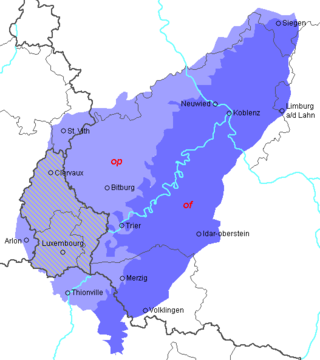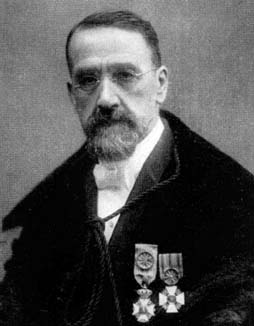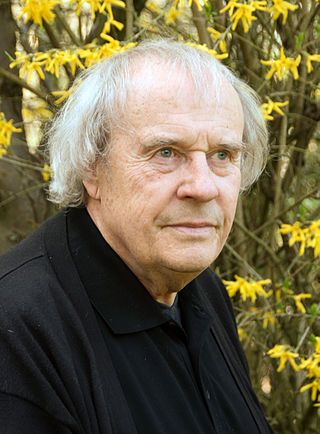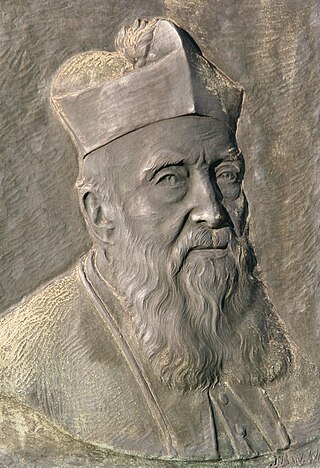
Luxembourgish is a West Germanic language that is spoken mainly in Luxembourg. About 400,000 people speak Luxembourgish worldwide.

Eugène Charles Catalan was a French and Belgian mathematician who worked on continued fractions, descriptive geometry, number theory and combinatorics. His notable contributions included discovering a periodic minimal surface in the space ; stating the famous Catalan's conjecture, which was eventually proved in 2002; and, introducing the Catalan number to solve a combinatorial problem.
The German occupation of Luxembourg in World War II began in May 1940 after the Grand Duchy of Luxembourg was invaded by Nazi Germany. Although Luxembourg was officially neutral, it was situated at a strategic point at the end of the French Maginot Line. On 10 May 1940, the German Wehrmacht invaded Luxembourg, Belgium and the Netherlands. Luxembourg was initially placed under a military administration, but later became a civilly administrated territory and finally was annexed directly into Germany. The Germans believed Luxembourg to be a Germanic state, and attempted to suppress what they perceived as alien French language and cultural influences. Although some Luxembourgers joined the resistance or collaborated with the Germans, both constituted a minority of the population. As German nationals, from 1942, many Luxembourgers were conscripted into the German military. Nearly 3,500 Luxembourgish Jews were murdered during the Holocaust. The liberation of the country by the Allies began in September 1944, but due to the Ardennes Offensive it was not completed until early 1945.

The linguistic situation in Luxembourg is characterized by the practice and the recognition of three official languages: French, German, and the national language Luxembourgish, established in law in 1984. These three languages are also referred to as the three administrative languages. As of 2018, 98% of the population was able to speak French at more or less a high level, 78% spoke German, and 77% Luxembourgish.

The culture of Luxembourg refers to the cultural life and traditions of Luxembourg. Most citizens are trilingual, speaking French and German in addition to the Germanic national language of Luxembourgish. Although its contributions to the arts are not largely known outside its borders, Luxembourg has a rich cultural history, especially in music, painting and photography. Its evolving museums, concert halls, theatres and galleries testify to its citizens' growing appreciation of culture.

From August 1914 until the end of World War I on 11 November 1918, the Grand Duchy of Luxembourg was under full occupation by the German Empire. The German government justified the occupation by citing the need to support their armies in neighbouring France, although many Luxembourgers, contemporary and present, have interpreted German actions otherwise.

Lesbian, gay, bisexual and transgender (LGBT) people in Luxembourg enjoy similar rights to non-LGBT people. Partnerships, which grant many of the benefits of marriage, have been recognised since 2004. In June 2014, the Luxembourgish Parliament passed a law enabling same-sex marriage and adoption rights, which took effect on 1 January 2015. Additionally, discrimination on the basis of sexual orientation and "change of sex" in employment, healthcare and the provision of goods and services is outlawed, and transgender people are allowed to change their legal gender on the basis of self-determination.

The National Literature Centre, abbreviated CNL, is the national literary archive of Luxembourg. It is based in the town of Mersch, about 15 kilometers to the north of Luxembourg City. Created as a research library in 1995, the CNL's collections include more than 40,000 volumes, a majority of them written by authors of Luxembourgish descent or residing in Luxembourg, as well as an ever-growing collection of manuscripts, letters and personal items. The library also collects newspaper clippings relating to Luxembourgish literature and literary journals and serials. As one of Luxembourg's legal deposit libraries, it receives copies of nearly all books produced in Luxembourg and actively purchases monographs by Luxembourgish authors printed abroad.
Multilingualism is a part of everyday life for the population of Luxembourg. Legally and socially, different sectors of Luxembourg use French, German, and Luxembourgish, which is a variety of Moselle Franconian, partially mutually intelligible with the neighbouring High German but with a large number of loanwords from French. Additionally, most citizens learn English and may study other languages as well. A substantial immigrant population has brought numerous immigrant languages to the small state, notably Portuguese, which is spoken by more than one-fifth of the population. However, the different languages are used in different social situations.

Luxembourg nationality law is ruled by the Constitution of Luxembourg. The Grand Duchy of Luxembourg is a member state of the European Union and, therefore, its citizens are also EU citizens.

Joseph Jean Baptiste Neuberg was a Luxembourger mathematician who worked primarily in geometry.
The following lists events that happened during 2009 in the Grand Duchy of Luxembourg.

The Luxembourgian Patriot League, was a Luxembourgian Resistance movement during World War II. When Luxembourg was invaded and annexed by Nazi Germany in 1940, a national consciousness started to come about. The LPL was founded on 4 September 1940 at the Lycée of Echternach in Echternach by Raymond Petit.
The literature of Luxembourg is little known beyond the country's borders, partly because Luxembourg authors write in one or more of the three official languages, partly because many works are specifically directed to a local readership. Furthermore, it was not until the 19th century that the literature of Luxembourg began to develop in parallel with growing awareness of the country's national identity following the Treaty of Paris (1815) and the Treaty of London (1867).

Félix Thyes was a Luxembourg writer. He is recognized as the first Luxembourg author to write a novel in French. Marc Bruno, profil d'artiste was published shortly after his death in 1855. He was also the first literary historian to discuss literature written in Luxembourgish.

Josy (Joseph) Braun was a Luxembourg writer, journalist and translator who wrote mainly in Luxembourgish.

The Luxembourgish government in exile, also known as the Luxembourgish government in London, was the government in exile of Luxembourg during the Second World War. The government was based in London between 1940 and 1944, while Luxembourg was occupied by Nazi Germany. It was led by Pierre Dupong, and also included three other Ministers. The head of state, Grand Duchess Charlotte, also escaped from Luxembourg after the occupation. The government was bipartite, including two members from both the Party of the Right (PD) and the Socialist Workers' Party (LSAP).
When Luxembourg was invaded and annexed by Nazi Germany in 1940, a national consciousness started to come about. From 1941 onwards, the first resistance groups, such as the Letzeburger Ro'de Lé'w or the PI-Men, were founded. Operating underground, they secretly worked against the German occupation, helping to bring political refugees and those trying to avoid being conscripted into the German forces across the border, and put out patriotic leaflets encouraging the population of Luxembourg to pull through.

Johannes Olav Fallize, Ph.D., D.Th., was the first Roman Catholic bishop in Norway since the Reformation. As the head of the Catholic Church of Norway for 35 years, he was the Prefect Apostolic of Norway from 1887 to 1892 and the Vicar Apostolic of Norway from 1892 to 1922.

The Civil Administration Area of Luxembourg was a German civil administration in German-occupied Luxembourg that existed from 29 July 1940 to 30 August 1942, when Luxembourg was annexed into Gau Moselland.















